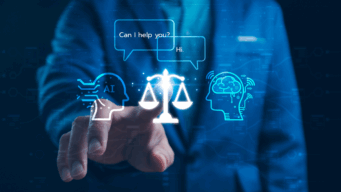When you hear “Kennedy Archives,” you might think of classified documents, high-profile investigations, and decades of public scrutiny. However, buried in the thousands of government records—many of which are poorly scanned, redacted, or handwritten—is a valuable case study in modern eDiscovery AI.
During a live demonstration, OpenText experts showcased how OpenText™ eDiscovery uses artificial intelligence and advanced analytics to make sense of this complex collection—uncovering long-buried connections and illustrating how the same techniques can be used to speed through modern investigations and pretrial discovery.
Deciphering complexity with eDiscovery AI
PDF images filled with smudged typewriter text, blacked-out sections, conflicting narratives, and handwritten margin notes push the limits of traditional review tools.
To tackle these challenges, OpenText experts demonstrated how AI-powered capabilities in OpenText™ eDiscovery help legal teams cut through the noise:
- Use external metadata and interactive timelines to view documents by date and spot communication patterns—powered by tools like OpenText eDiscovery Hypergraph
- Extract text from image-only PDFs using optical character recognition (OCR), then analyze concepts, keyword context, and language detection with built-in tools
- Enrich documents automatically with OpenText Intelligent Classification (Magellan) to identify people, organizations, places, sentiment, PII, and more
- Transcribe audio files for fast search and analysis—so reviewers can surface key people, places, and tone without having to listen to every file
- Leverage OpenText eDiscovery Aviator GenAI to:
- Summarize concept group labels
- Generate contextual document summaries (leveraging knowledge beyond the dataset)
- Rapidly summarize document sets based on a custom prompt or text from an existing document
- Automatically classify files as Responsive or Non-Responsive with OpenText eDiscovery Aviator Review
These are not hypothetical capabilities—they’re available today and built to help legal teams triage large, messy document sets with speed and precision.
Speed to facts: Then and now
One of the more striking moments in the session came when the solution expert used a single letter from a key figure in the Kennedy investigation as the foundation for an entire line of inquiry.
Using predictive search, related documents were identified based on tone, content, and context—not just keywords. Results included documents with conflicting timelines, correspondence with emotionally charged language, and even information that appeared unrelated at first glance but actually revealed deeper thematic connections.
That same “speed to facts” is what legal teams need today. Whether reviewing 1,000 or 1 million documents, AI can help legal teams and investigators to identify key players and individuals much earlier in the process, spotlight inconsistencies, and even track sentiment shifts over time.
Lessons for today’s legal teams
- The Kennedy Archives are messy, inconsistent, and full of ambiguity—just like real-world data sets legal teams deal with today.
- Tools that can handle incomplete, redacted, or poorly formatted material give investigators more confidence and control from the outset.
- OpenText eDiscovery’s AI capabilities—especially concept clustering, entity extraction, and intelligent summarization—translate directly to corporate and regulatory matters.
- Whether you’re looking for a smoking gun or trying to piece together intent, GenAI can help reduce blind spots and sharpen your strategy.
eDiscovery AI tools enable teams to go beyond the obvious by leveraging intelligent data classification and visual communication analysis, which reveal subtle patterns and insights often missed by older systems.
Ultimately, the lessons from this case study translate directly to today’s legal challenges—helping teams apply these insights and proven AI-driven techniques to navigate even the most voluminous, ambiguous, or fragmented document sets with greater precision and strategic clarity.
Watch the full webinar to see how OpenText eDiscovery AI uncovered insights in the Kennedy Archives—and how those same techniques apply to your next matter.




